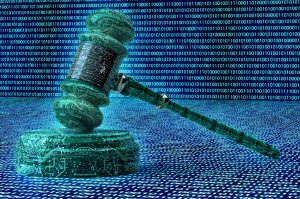Ethics Opinion Misses The Mark On Tech Competence
The technology that affects the practice of law is not just the technology used by lawyers. It is also the technology used by clients.

(Image via Getty)
I should be praising Louisiana, not criticizing it, for issuing an ethics opinion holding that lawyers must consider the benefits and risks associated with technology in representing a client. But the opinion misses the mark in two significant ways.
Above the Law columnist Nicole Black has already written about this opinion in The Daily Record and hit on one of its shortcomings. The opinion presumes that using technology in law practice is optional and that a lawyer must be competent in technology only if the lawyer chooses to use technology.

Early Adopters Of Legal AI Gaining Competitive Edge In Marketplace
As Black points out, the duty to be competent in technology should not kick in only if a lawyer “chooses” to use technology. Rather, lawyers must be competent even to make the initial choice of whether and how to use technology in a matter. Black writes:
This is an important distinction since in 2019 it is impossible for lawyers to practice law without encountering – and thus necessarily gaining an understanding of – technology in one form or another. And the failure of lawyers to understand how a given technology works and how it will affect their clients’ matters is a violation of the duty of competence at best, and malpractice at worst.
But the opinion also falls short in a second way. It discusses the duty of technology competence as relating solely to lawyers’ direct use of a particular technology or technology-related service. This is the opinion’s overall conclusion:
A lawyer must consider the benefits and risks associated with using technology in representing a client. When a lawyer uses technology in representing a client, the lawyer must use reasonable care to protect client information and to assure that client data is reasonably secure and accessible by the lawyer.
Sponsored

Is The Future Of Law Distributed? Lessons From The Tech Adoption Curve

Legal AI: 3 Steps Law Firms Should Take Now

The Business Case For AI At Your Law Firm


Is The Future Of Law Distributed? Lessons From The Tech Adoption Curve
As you can see, this conclusion is directed solely at a lawyer’s own use of technology, and only when used in representing a client. But that misses a critical component of the duty of technology competence — understanding the client’s use of technology. A lawyer cannot competently represent a client if the lawyer does not understand the client’s technology usage and systems and how they may relate to the matter at hand.
This point was made repeatedly in the first ethics opinion ever to interpret the duty of technology competence under Model Rule 1.1. The State Bar of California’s Formal Opinion No. 2015-193 dealt with the duty of technology competence in the context of e-discovery. In making the point that an attorney should be able to assess the competency issues in every case, the opinion said:
Not every litigated case involves e-discovery. Yet, in today’s technological world, almost every litigation matter potentially does. The chances are significant that a party or a witness has used email or other electronic communication, stores information digitally, and/or has other forms of ESI related to the dispute.
That is not talking about the lawyer’s direct use of technology. It’s about understanding the client’s technology. In fact, the opinion goes on to list the tasks a competent attorney should be able to perform, and they expressly include such things as analyzing and understanding a client’s data-storage systems.
Similarly, the ABA’s first opinion to address Model Rule 1.1, Comment 8 — Formal Opinion 477 issued in 2017 — makes the point repeatedly that the duty of technology competence encompasses the ability to understand how the client uses technology, what technology systems the client uses, and the client’s degree of technology sophistication.
Sponsored

Navigating Financial Success by Avoiding Common Pitfalls and Maximizing Firm Performance

Early Adopters Of Legal AI Gaining Competitive Edge In Marketplace
At my LawSites blog, I track the states that have adopted the duty of technology competence as embodied in ABA Model Rule 1.1, Comment 8. Louisiana has not formally adopted the model rule. However, in 2018, it amended its Code of Professionalism for lawyers to add two provisions related to technology. One relates to professionalism on social media. The other comes close to echoing the model rule:
I will stay informed about changes in the law, communication, and technology which affect the practice of law.
The technology that affects the practice of law is not just the technology used by lawyers. It is also the technology used by clients. Whether the lawyer is conducting discovery, handling a divorce, drafting a licensing agreement, or representing a criminal defendant, the client’s use of technology is likely to be implicated. A lawyer who lacks competence in technology cannot competently represent that client.
The opinion makes some important points about lawyers’ duty to be competent and to protect client data and communications. Even so, it falls short in two critical respects. Technology competence should not be optional based on a lawyer’s choice of practice tools, and it should not be limited to the lawyer’s own technology, but should also extend to the client’s.
 Robert Ambrogi is a Massachusetts lawyer and journalist who has been covering legal technology and the web for more than 20 years, primarily through his blog LawSites.com. Former editor-in-chief of several legal newspapers, he is a fellow of the College of Law Practice Management and an inaugural Fastcase 50 honoree. He can be reached by email at ambrogi@gmail.com, and you can follow him on Twitter (@BobAmbrogi).
Robert Ambrogi is a Massachusetts lawyer and journalist who has been covering legal technology and the web for more than 20 years, primarily through his blog LawSites.com. Former editor-in-chief of several legal newspapers, he is a fellow of the College of Law Practice Management and an inaugural Fastcase 50 honoree. He can be reached by email at ambrogi@gmail.com, and you can follow him on Twitter (@BobAmbrogi).








